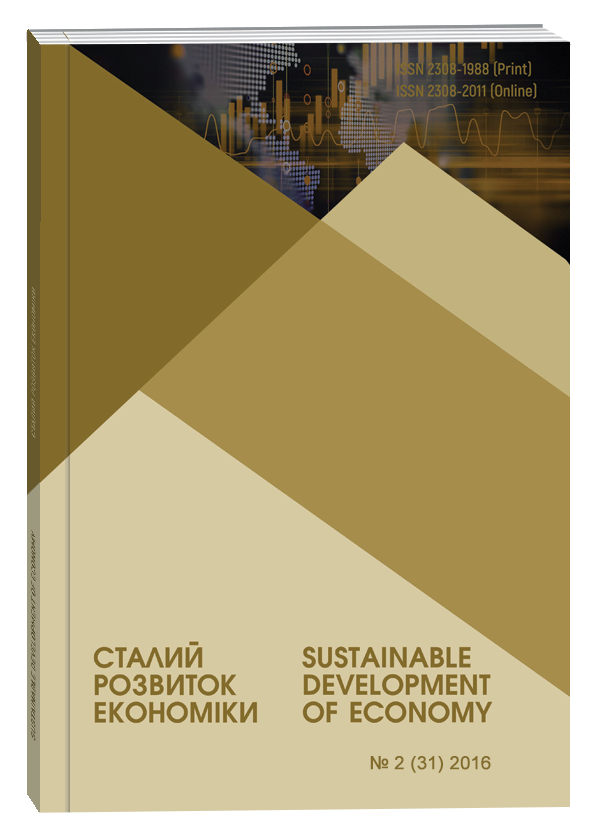STRATEGIC PLANNING IN MARKETING MANAGEMENT
Abstract
Purpose. The aim of the article is to study the role of strategic planning in enterprise management in a competitive environment. In accordance with the purpose of the investigation were defined such tasks – to study the literary sources on the subject of the definition of the concept of strategic planning; disclose the benefits, objectives, principles and models of strategic planning; consider the types of marketing strategies; direct stages of development and the structure of the marketing program of the company. Methodology of research. The methodological base of scientific research is fundamental principles of modern economic theory, scientific works of native and foreign scholars concerning the strategic planning in the management of enterprises. In the process of research were used such general scientific methods as abstract and logical – to identify the nature of the concepts of strategic planning, marketing strategy, marketing program; forecasting – in determining the perspectives of the development of enterprise; dialectical knowledge – to clarify the situation of the company in a competitive environment; monographic – to study the basic principles of strategic planning; comparison – to select marketing strategies. Findings. It has been noted that after Ukraine’s accession to the WTO and the signing of the economic part of the Association Agreement Ukraine-EU enterprises must orient their activities to manufacture products that meet international standards. It also has been proved that to meet the needs of consumers, enterprises can use, in particular, a set of marketing tools as a result of strategic management. The objectives, principles, advantages, models of strategic planning in marketing management have been grounded. It has been emphasized that strategic planning is carried out on such levels as: enterprise, business subdivision, product. The extend models of strategic planning by the method of "top down" and also the general plan of the enterprise have been characterized. The diversities of marketing strategies have been detailed. The most famous marketing strategies that are based on “price – quantity” and “benefits strategy” have been disclosed. Marketing tools which are used in the process of development of marketing programs, in particular: product, distribution, price and promotion have been determined. The stages of development of marketing programs such as: the study goals and marketing strategies, analysis of the market environment, determination of the components of the structure, formation of the marketing mix have been directed. The structure of the marketing program has been concretized. Originality. It has been determined the need for strategic planning of enterprises in a mixed economy. Also it has been proved that in a competitive environment, in the absence of the necessary experience, part resource support of profitable enterprises can be achieved in particular through the use of complex marketing vehicles. Practical value. The results of scientific research can be used to: identify prerequisites for transition of enterprises to strategic planning; select a model of strategic planning of enterprises; definition of the concept of marketing activities; developing marketing programs; taking into account the managers objective and subjective factors which influence the future development of the company.
References
Про Україну. Світова організація торгівлі. [Електронний ресурс]. – Режим доступу: http://mfa.gov.ua/ua/about-ukraine/international-organizations/wto.
Армстронг Г. Маркетинг. Загальний курс / Г. Армстронг, Ф. Котлер. – М. : Вільямс, 2001. – 608 с.
Маркетинговий менеджмент. Маркетингове стратегічне планування та розробка маркетингових програм. [Електронний ресурс]. – Режим доступу: http://elib.lutsk- ntu.com.ua/book/fb/mm/2011/11-80/Lection/Ch_1.htm.
Котлер Ф. Основы маркетинга / Ф. Котлер // Под. ред. Е. М. Пеньковой. – М. : Прогресс, 1990. – 736 с.
Гаркавенко С. С. Маркетинг / С. С. Гаркавенко. – К. : Лібра, 2007. – 720 с.
Дем’яненко С. І. Менеджмент аграрних підприємств / С. І. Дем’яненко. – К. : КНЕУ, 2005. – 347 с.
Маркетинг для магістрів / За ред. С. М. Іляшенка. – Суми : Університетська книга, 2007. – 928 с.
Баланюк І. Ф. Маркетингове забезпечення товарної політики / І. Ф. Баланюк // Інноваційна економіка. – 2015. – № 1 [56]. – С. 143–149.
Завадський Й. С. Менеджмент. У 3 т. – Т. 1. / Й. С. Завадський. – К. : Вид-во Європ. ун-ту. – 2001. – 542 с.
About Ukraine (2015), “World trade organization”, available at: http://mfa.gov.ua/ua/about- ukraine/international-organizations/wto (access date May 23, 2016).
Armstrong, G. and Kotler, F. (2001), Marketyng [Marketing], Wiliams, Moscow, Russia, 608 p.
Marketing management (2011), “Marketing strategic planning and development of marketing programs”, available at: http://elib.lutskntu.com.ua/book/fb/mm/2011/11-80/Lection/Ch_1.htm (access date May 23, 2016).
Kotler, F. (1990), Osnovy marketinga [Bases of Marketing], Translated by E. M Penkova, Progress, Moscow, Russia, 736 p.
Harkavenko, S.S. (2015), Marketing [Marketing], textbook, Libra, Kyiv, Ukraine, 720 p.
Demianenko, S.I. (2005), Menedzment agrarnykh pidpryiemstv [Management of agrarian enterprises], KNEU, Kyiv, Ukraine, 347 p.
Iliashevych, S.M. (2007), Marketynh dlia mahistriv [Marketing for masters], textbook, University book, Sumy, Ukraine, 928 p.
Balaniuk, I.F. (2015), “Marketing ensuring of goods policy”, Innovative economy, no. 1 [56], pp. 143-149. 542 p.


